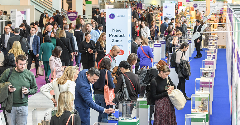News
Five a Day Won’t Stop the Body Rusting Away Through Oxidation – but Antioxidants can Blast Those Free Radicals Way
5 Aug 2014The human body rusts in the same way that a bicycle does if it is left outside and unprotected from the rain. The oxygen in the air combines with the metal, and rust forms through a process called oxidation. This rusting process also occurs in every hour of every day in the human body. It […]

The human body rusts in the same way that a bicycle does if it is left outside and unprotected from the rain. The oxygen in the air combines with the metal, and rust forms through a process called oxidation.
This rusting process also occurs in every hour of every day in the human body. It does not matter what we do or where we are, oxidation is required by the human body to provide energy from the food we consume. Oxygen is a corrosive gas, and a by-product of the process of oxidation is the production of free radicals. This can create a number of problems, as the body’s natural immune system can be broken down.
Missing electron
Free radicals are formed through the metabolism of oxygen, where a missing electron creates a chain effect, leading to unstable molecules which multiply and begin a chain reaction that never ends. This is what happens in individual cells, causing a change in shape, or the cell to die or even mutate into a cancer cells.
The body has a built in system to balance free radicals, neutralising free radicals as well as repairing the damage they inflict on the body. The natural defence system is composed of antioxidants, of which the most prevalent is SOD (superoxidise dismutase). The second natural defence system comes from the food we consume that contains vitamins and minerals that the body can use. These nutrients fight free radicals and help repair and rebuild cells.
5 a day …..
The legendary 5 a day fruit and veg campaign in the UK was a great marketing success and has become a household phrase. However, reports claim we may have been duped: it is now considered to be out of date, and scientists now believe that eight portions of fruit and veg are more beneficial.
Vegetables offer some vitamins, but your body will be able to absorb these only if you add some fat, such as butter or olive oil.
Antioxidants – an electron donor.
They came to public attention in the 1990s in findings which showed, in some studies, that people with low levels of antioxidants were at greater risks from chronic conditions like cancer. This created mass hysteria in the media, even before the results of these trials were published, and was followed by the hype that green tea, frozen berries and the like claimed anti-carcinogenic powers.
The trials have not had the hoped-for results, meaning that no single substance can do the work of a whole crowd and, while research continues, we need to have more antioxidants in our diets to counter the oxidants that damage the body’s cells, either as a result of normal metabolic processes or as a reaction to environmental chemicals and pollutants. Modern life exposes our body to a wide variety of potentially damaging materials; reducing these, and increasing our levels of antioxidants, may improve our defences against free radicals.
Related news

Paris Olympics: Food and beverage brands champion health, fun, and sustainability
5 Aug 2024
Food and beverage brands are aligning with the Paris Olympics 2024 Food Vision, which emphasises sustainability, local sourcing, and plant-based diets.
Read more
Natural Remedies: Bringing health and happiness via validated branded ingredients
18 Apr 2024
Natural Remedies is an internationally renowned botanical healthcare company committed to advancing the field through rigorous research and the development of clinically validated Branded Ingredients. Guided by our foundational principle of ‘BEING USEF...
Read more
Exploring the future of health and wellness retail at Vitafoods Europe
14 Mar 2024
With retail-focussed content sessions, buyer networking, and finished product tasting sessions, this year’s Vitafoods Europe offers a not-to-be-missed opportunity for retailers to up their health and wellness game.
Read more
Sustainability meets innovation at Fi Europe 2023's Sustainability Ingredients Zone
9 Jan 2024
Fi Europe’s Sustainable Ingredients Zone showcases ingredients forging a path toward a greener future. Three innovators are redefining what sustainability within the food and beverage industry means, with upcycled products, regenerative agriculture, an...
Read more
Unleashing the power of plants at Fi Europe’s New Product Zone
5 Jan 2024
In the diverse landscape of plant-based innovation, Fi Europe 2023's New Product Zone spotlighted ten plant-based ingredients, tailored to meet the rising demand for sustainable and delicious options.
Read more
Meet the innovative ingredients showcased at Fi Europe’s New Product Zone
3 Jan 2024
The Food Ingredients category at Fi Europe’s New Product Zone featured 19 distinct and innovative products. From fermented delights to sustainable proteins, these ingredients are ready to make their mark in the market.
Read more
Fi Europe’s New Product Zone elevates the nutrition of everyday indulgences
22 Dec 2023
At Fi Europe 2023's New Product Zone, eight health ingredients, each offering an enhanced nutritional profile of various products, were on display. These ingredients address the evolving needs of the food and beverage industry and cater to consumers se...
Read more
Fi Europe’s New Product Zone explores fresh possibilities with five natural ingredients
20 Dec 2023
Fi Europe 2023's New Product Zone unveils five natural ingredients, each catering to the growing demand for clean products and embodying ethical and sustainable choices for today's conscious consumers.
Read more
Water-conscious consumers, upcycled food, and tech-driven sustainability: Highlights from Fi Europe, part 2
14 Dec 2023
With climate change becoming a tangible reality, consumers’ environmental concerns are changing. At Fi Europe, market analysts revealed how people are now interested in everyday issues like water shortages and tech-driven solutions such as GM drought-r...
Read more
The food industry’s single-use packaging problem
12 Dec 2023
The food industry’s reliance on single-use packaging is a sustainability “sticking point” with viable alternatives not widely available – but new EU rules mean food businesses will remain responsible for the collection and disposal of the packaging the...
Read more